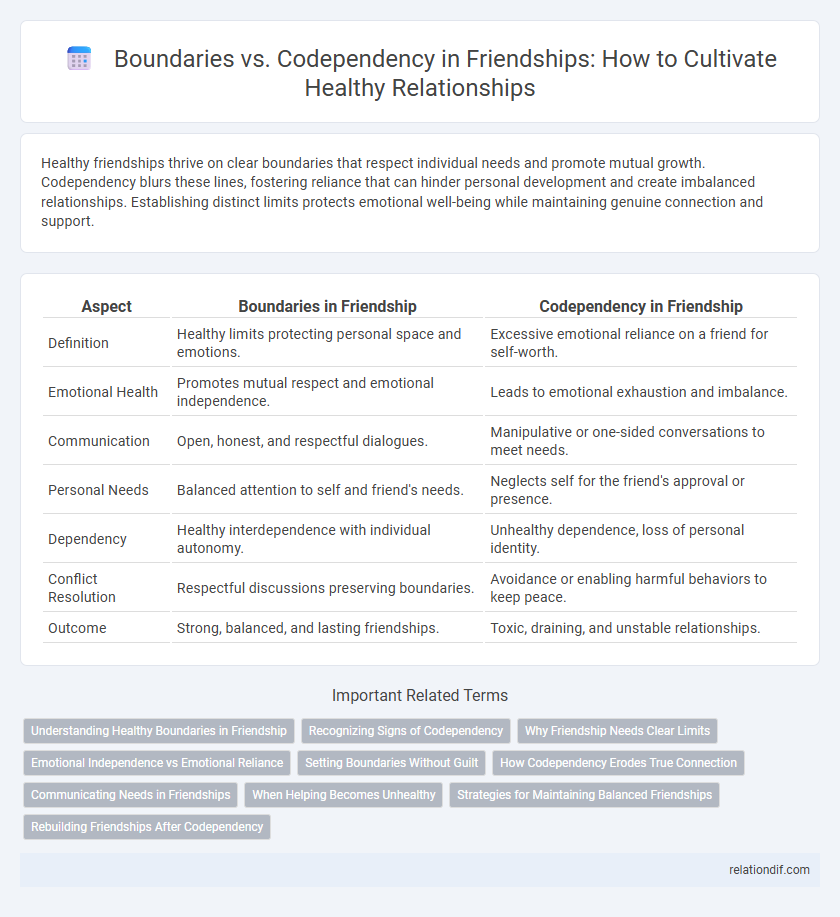Healthy friendships thrive on clear boundaries that respect individual needs and promote mutual growth. Codependency blurs these lines, fostering reliance that can hinder personal development and create imbalanced relationships. Establishing distinct limits protects emotional well-being while maintaining genuine connection and support.
Table of Comparison
| Aspect | Boundaries in Friendship | Codependency in Friendship |
|---|---|---|
| Definition | Healthy limits protecting personal space and emotions. | Excessive emotional reliance on a friend for self-worth. |
| Emotional Health | Promotes mutual respect and emotional independence. | Leads to emotional exhaustion and imbalance. |
| Communication | Open, honest, and respectful dialogues. | Manipulative or one-sided conversations to meet needs. |
| Personal Needs | Balanced attention to self and friend's needs. | Neglects self for the friend's approval or presence. |
| Dependency | Healthy interdependence with individual autonomy. | Unhealthy dependence, loss of personal identity. |
| Conflict Resolution | Respectful discussions preserving boundaries. | Avoidance or enabling harmful behaviors to keep peace. |
| Outcome | Strong, balanced, and lasting friendships. | Toxic, draining, and unstable relationships. |
Understanding Healthy Boundaries in Friendship
Healthy boundaries in friendship involve recognizing and respecting each other's personal limits, allowing for mutual trust and individual growth. Establishing clear boundaries prevents codependency, where one person excessively relies on the other for emotional support or validation. Friends maintain balance by communicating needs openly and honoring each other's space without guilt or resentment.
Recognizing Signs of Codependency
Recognizing signs of codependency in friendships includes an excessive need for approval, a persistent fear of abandonment, and an imbalance where one person consistently sacrifices their needs for the other. Individuals may ignore personal boundaries, leading to emotional exhaustion and loss of self-identity. Awareness of these patterns is crucial to maintaining healthy, mutually supportive friendships.
Why Friendship Needs Clear Limits
Clear boundaries in friendship prevent codependency by fostering mutual respect and individuality, essential for healthy, balanced relationships. Defining personal limits helps maintain emotional well-being and ensures both friends support each other without losing their autonomy. Establishing boundaries promotes trust and prevents resentment, strengthening the durability of the friendship over time.
Emotional Independence vs Emotional Reliance
Maintaining clear boundaries in friendships fosters emotional independence, allowing individuals to support each other without losing their sense of self. Emotional reliance becomes codependent when one depends excessively on the other for validation, leading to unhealthy attachment patterns. Healthy friendships balance mutual support with personal autonomy, preventing emotional exhaustion and promoting growth.
Setting Boundaries Without Guilt
Setting healthy boundaries in friendship fosters mutual respect and prevents emotional exhaustion, ensuring both parties maintain individuality. Clear communication about limits helps avoid codependency by promoting balanced support rather than excessive reliance. Embracing these boundaries without guilt empowers friendships to thrive through trust and autonomy.
How Codependency Erodes True Connection
Codependency erodes true connection by fostering imbalance where one person sacrifices their needs to maintain the relationship, leading to emotional exhaustion and resentment. Boundaries preserve individuality and mutual respect, enabling healthier interactions and authentic support. Without boundaries, codependency blurs self-identity, creating toxic dependency that undermines genuine friendship.
Communicating Needs in Friendships
Clearly articulating personal needs in friendships prevents codependency by promoting mutual respect and independence. Establishing healthy boundaries ensures that both parties feel valued without losing their individual identity or emotional autonomy. Effective communication fosters trust and creates a balanced dynamic where needs are acknowledged and met without over-reliance.
When Helping Becomes Unhealthy
Setting clear boundaries in friendships prevents the shift from supportive helping to unhealthy codependency, where one person's needs overshadow the other's well-being. Codependency often involves excessive emotional reliance and a loss of individual autonomy, leading to stress and imbalance in the relationship. Recognizing signs such as one-sided support and inability to say no helps maintain healthy, balanced friendships.
Strategies for Maintaining Balanced Friendships
Establishing clear boundaries is essential to prevent codependency and maintain healthy friendships, ensuring mutual respect for personal space and individual goals. Regular communication about needs and limits helps friends understand each other's expectations, reducing emotional strain. Encouraging autonomy while offering support fosters balanced relationships based on trust and independence.
Rebuilding Friendships After Codependency
Rebuilding friendships after codependency requires establishing clear boundaries to foster mutual respect and individual growth. Recognizing personal needs and communicating them honestly helps break unhealthy patterns and promotes emotional independence. Prioritizing self-care and balanced interactions strengthens trust and prevents relapse into codependent behaviors.
Boundaries vs Codependency Infographic

 relationdif.com
relationdif.com